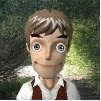
Recently read "Retromania" by Simon Reynolds, subtitled "Pop Culture's Addiction to Its Own Past". As an official card-carrying geezer, this is familiar territory to me. Listening to radio, I thunder like an Old Testament prophet: "There is nothing new under the sun!" (I may have mentioned it before, but there was an old National Lampoon article that revealed, there only being so many musical notes and only so many combinations, the last new song would have been written in the late '80s.)
Reynolds rails (nice, eh?) against the laziness of pop music: find a hit, repeat the formula ad nauseam... Even lesser bands that have nothing to lose by taking a chance couch their music in familiar patterns. It's like I described current popular country music to someone: it already sounds familiar the first time you hear it.
Sampling, remakes, tributes -- all of pop music comes under Reynold's withering gaze and comes up wanting. He does, however, have a glimmer of hope: for him, the '60s was groundbreaking, the '70s not so much...he feels newness is cyclical, and we have bright days ahead, eventually.
As depressing as I found "Retromania", I did get a great album recommend: "Music Has the Right to Children" by Boards of Canada. It was one of the albums that set Radiohead on their pilgrimage after "Ok Computer" into the wilds of "Kid A". The Boards album came out in 1998, and it was an electronic album that rejected the cold android feel of then-popular electronic pop and instead took a cue from Eno's '70s work. Short vignettes drift across the soundscape, make their statement and move on. These aren't 'songs, but visual events captured in sound.
My feeling is that Radiohead learned from this approach and raised it to a whole new level, but I was fascinated to hear some of the compost that Radiohead used to fertilize their new music.

 Recently read "Retromania" by Simon Reynolds, subtitled "Pop Culture's Addiction to Its Own Past". As an official card-carrying geezer, this is familiar territory to me. Listening to radio, I thunder like an Old Testament prophet: "There is nothing new under the sun!" (I may have mentioned it before, but there was an old National Lampoon article that revealed, there only being so many musical notes and only so many combinations, the last new song would have been written in the late '80s.)
Reynolds rails (nice, eh?) against the laziness of pop music: find a hit, repeat the formula ad nauseam... Even lesser bands that have nothing to lose by taking a chance couch their music in familiar patterns. It's like I described current popular country music to someone: it already sounds familiar the first time you hear it.
Sampling, remakes, tributes -- all of pop music comes under Reynold's withering gaze and comes up wanting. He does, however, have a glimmer of hope: for him, the '60s was groundbreaking, the '70s not so much...he feels newness is cyclical, and we have bright days ahead, eventually.
As depressing as I found "Retromania", I did get a great album recommend: "Music Has the Right to Children" by Boards of Canada. It was one of the albums that set Radiohead on their pilgrimage after "Ok Computer" into the wilds of "Kid A". The Boards album came out in 1998, and it was an electronic album that rejected the cold android feel of then-popular electronic pop and instead took a cue from Eno's '70s work. Short vignettes drift across the soundscape, make their statement and move on. These aren't 'songs, but visual events captured in sound.
My feeling is that Radiohead learned from this approach and raised it to a whole new level, but I was fascinated to hear some of the compost that Radiohead used to fertilize their new music.
Recently read "Retromania" by Simon Reynolds, subtitled "Pop Culture's Addiction to Its Own Past". As an official card-carrying geezer, this is familiar territory to me. Listening to radio, I thunder like an Old Testament prophet: "There is nothing new under the sun!" (I may have mentioned it before, but there was an old National Lampoon article that revealed, there only being so many musical notes and only so many combinations, the last new song would have been written in the late '80s.)
Reynolds rails (nice, eh?) against the laziness of pop music: find a hit, repeat the formula ad nauseam... Even lesser bands that have nothing to lose by taking a chance couch their music in familiar patterns. It's like I described current popular country music to someone: it already sounds familiar the first time you hear it.
Sampling, remakes, tributes -- all of pop music comes under Reynold's withering gaze and comes up wanting. He does, however, have a glimmer of hope: for him, the '60s was groundbreaking, the '70s not so much...he feels newness is cyclical, and we have bright days ahead, eventually.
As depressing as I found "Retromania", I did get a great album recommend: "Music Has the Right to Children" by Boards of Canada. It was one of the albums that set Radiohead on their pilgrimage after "Ok Computer" into the wilds of "Kid A". The Boards album came out in 1998, and it was an electronic album that rejected the cold android feel of then-popular electronic pop and instead took a cue from Eno's '70s work. Short vignettes drift across the soundscape, make their statement and move on. These aren't 'songs, but visual events captured in sound.
My feeling is that Radiohead learned from this approach and raised it to a whole new level, but I was fascinated to hear some of the compost that Radiohead used to fertilize their new music.
